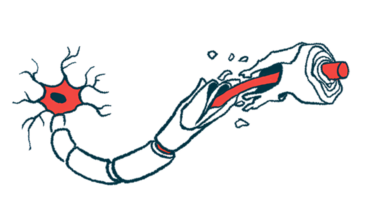Complement protein activation is linked to more severe MS
Researchers explored whether network is activated via classical pathway

Complement proteins, especially when activated in the brain and spinal cord, may contribute to nerve cell damage and more severe multiple sclerosis (MS) symptoms, a study that offers insights into a possible therapeutic target suggests.
The study, “Complement Activation Is Associated With Disease Severity in Multiple Sclerosis,” was published in Neuroimmunology & Neuroinflammation..
The complement system is a network of proteins that work alongside antibodies to surveil the body for worn-out cells and foreign intruders. Each complement protein is normally inactive and only becomes activated when some part of it breaks free, called cleaving.
Complement proteins have been seen to build up next to antibodies on MS lesions, the areas in the brain and spinal cord that have been damaged by the immune system attacking the myelin sheath, a fatty coating that protects nerve fibers.
Here, researchers investigated if complement becomes activated in MS via the classical pathway, one of three activation pathways. Unlike the other two, the classical pathway is activated by antibodies, or immunoglobulins, of the G and M classes (IgG and IgM).
Results of complement protein activation
The study included 112 people with clinically isolated syndrome (CIS), 90 with relapsing-remitting MS, 14 with primary progressive MS, and 23 with secondary progressive MS who were followed for a median of 6.3 years as part of the Swiss MS Cohort.
The study included as controls 31 people with an inflammatory neurological disease other than MS and 44 people with symptoms such as migraine that aren’t explained by clinical signs or other findings suggestive of a diagnosis.
In the cerebrospinal fluid (CSF), found in the tissue that surrounds the brain and spinal cord, but not the blood, the levels of complement proteins and their cleaved products increased with levels of albumin, one of the most abundant proteins in the blood.
Levels of C4a, a cleaved product formed with the activation of the classical complement pathway, were 19% higher in people with CIS than symptomatic controls. CIS is the first clinical presentation of neurological symptoms of MS.
In relapsing-remitting MS, where relapses are followed by periods of recovery, C4a was increased by 41%. In primary progressive MS, where symptoms worsen gradually, the increase was by 53%. It was 58% in secondary progressive MS, a stage that follows relapsing-remitting MS.
Measuring the levels of C3a and factor Ba, other classical pathway cleaved products, revealed similar findings. The increases were most pronounced in those with high levels of IgG and IgM in the CSF.
Increases in EDSS, MSSS scores
In people with CIS, having double the levels of C3a and C4a in the CSF was linked to scoring about 0.3 points higher on the Expanded Disability Status Scale (EDSS), where higher scores indicate greater disability.
Twice the levels of C3a and Ba in people with CIS or any other MS type was linked to an increase of up to about 0.7 points on the MS Severity Score (MSSS), a tool that predicts future disability, where higher scores indicate faster disease progression.
The levels of C3a, C4a, Ba, and factor Bb also were associated with up to 58% higher levels of neurofilament light chain (NfL), a small protein released into the bloodstream and other bodily fluids when nerve cells become damaged.
The findings show higher levels of complement proteins, particularly their cleaved products, are linked to worse disability and more severe disease progression. They’re also linked to nerve cell damage, suggesting complement activation may play a role in how MS develops and progresses.
“Complement inhibition should be explored as [a] therapeutic target,” wrote the researchers, who noted this “might be a novel therapeutic approach to attenuate disease severity in MS” and “one of the highly needed tools to combat ongoing smoldering progression.”






